Modern Player's Companion by Fossilized Rappy
The Occupational Class of ’04
Original SA post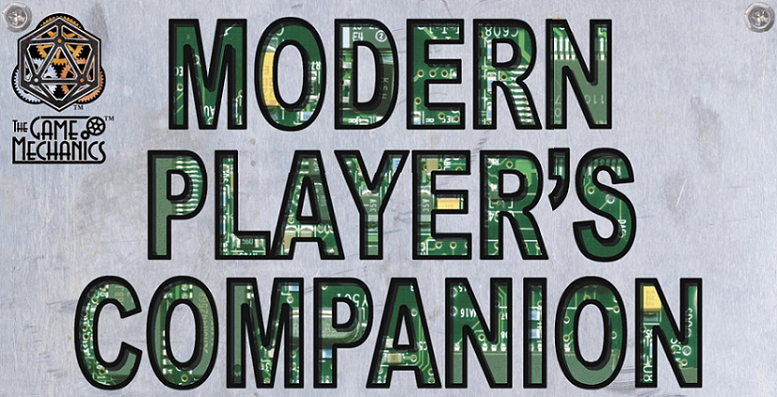
It's not often that you see the creators of a product tied to a big name company end up moving to a third party label to make more stuff for that same product: the Game Mechanics are a strong exception to this. Made up of a team of Wizards of the Coast contributors and freelancers including JD Wiker, Stan!, Monte and Sue Cook, Marc “Sparky” Schmalz, and Rich Redman that gathered forces after fears of corporate layoffs, TGM produced four major supplements (nine in PDF form, as they are split into parts as PDF) to the d20 Modern ruleset. And really, who better to start with for non-Fieldian d20 Modern guides than with the people who created it in the first place? Our first TGM title will aptly be the first one, the Modern Player’s Companion, a sourcebook comparable to the whole “Player’s Handbook 2+” idea Dungeons and Dragons went with. I will be reviewing them in the Modern Player's Companion and Modern Player's Companion II format the PDFs provided rather than as one single book like the print version, as this is
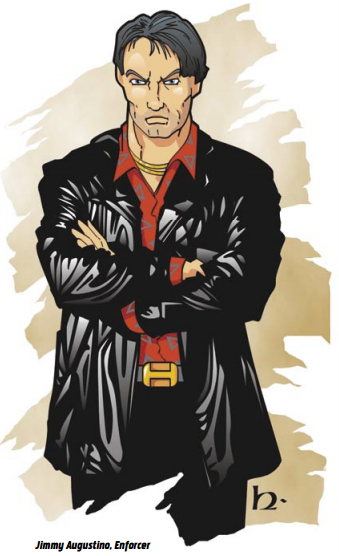
The Occupational Class of ’04
Occupations
It turns out that a book titled “Modern Player’s Companion” ends up focusing mostly on materials for the player. Shocking, I know. The first of these options you’ll end up getting are occupations. One of the big things about d20 Modern is that role is not tied to class alone. Occupations in a nutshell: in addition to base, advanced, and prestige classes, you have your occupation, which reflects what job your character did or is doing or what lot in life they happen to have. These grant you the choice to add extra class skills, feats, Reputation, and/or wealth on top of what your class would normally get. This means that while it's logical to have the Military occupation for a character who has levels in Smart Hero and Soldier, you could just as easily have the same classes combined with the Domestic occupation to make Peyote the War Gardener or whatever.
Out of the Open Game License-approved d20 Modern books from Wizards of the Coast themselves, we ended up getting a strong headstart with 33 occupations: Academic, Adventurer, Athlete, Blue Collar, Celebrity, Creative, Criminal, Dilettante, Doctor, Emergency Services, Entrepreneur, Investigative, Law Enforcement, Military, Religious, Rural, Student, Technician, and White Collar from the d20 Modern Core Rulebook, the Apothecary, Hedge Wizard, Novitiate, Psychic, Shadow Scholar, and Squire from Urban Arcana, and the Astronaut Trainee, Colonist, Drifter, Gladiator, Heir, Outcast, Scavenger, and Transporter from d20 Future. The Modern Player’s Companion adds seven more to the mix to patch up holes the creators saw in the occupation list.
-
Bohemian:
You’re a hedonistic fellow who isn’t a fan of The Man, man. You get four extra class skills chosen from those social, crafting, or knowledge skills such as Bluff, Forgery, or Sense Motive, as well as a +1 bonus to your Reputation score.
-
Bureaucrat:
One of the few occupations in the title I see as being kind of superfluous, as the Bureaucrat is more or less a specialized version of the White Collar occupation. The main difference is that while the White Collar occupation gets you two new class skills related to what you'd typically associate with desk work and offices combined with a +3 Wealth bonus increase, the Bureaucrat has the two new class skills but only receives a +2 bonus to Wealth, eschewing that extra +1 dough in favor of being able to gain either Educated or Renown as a bonus feat.
-
Craftsperson:
This occupation is sort of the bastard child of the Creative and Blue Collar occupations, reflecting a character who works as a plumber, blacksmith, carpenter, or other individual who mixes creating things with lots of manual labor. You get two class skills that are chosen from a mish-mash of crafting- and knowledge-associated skills, the choice of either Builder, Creative, or Gearhead as a bonus feat, and a +2 Wealth bonus increase.
-
Domestic:
Your job is to do everyday stuff for other people as a butler, maid, personal chef, or whatever. This manages to net you three class skills that are chosen from what are mostly either hands-on skills like Drive and Repair or intuitive skills such as Diplomacy and Gather Information, but also include a few oddballs like Hide or Concentration. You also get a +1 Wealth bonus.
-
Educator:
Another one that seems kind of superfluous, as the Academic occupation from the d20 Modern Core Rulebook specifically states it includes "scholars, professors, teachers, and other education professionals". As with White Collar versus Bureaucrat, there's a tradeoff involved: Academic gets you a choice of three intellectual class skills and a +3 bonus to Wealth, while Educator grants two class skills, a +2 Wealth bonus, and the choice of either Creative, Educated, or Studious as a bonus feat.
-
Politico:
Another one that seems like it would have fit with White Collar. Compared to the White Collar occupation, the Politico is pretty crazy: in addition to the two class skills and +3 Wealth bonus of the White Collar occupation, it also grants a +1 bonus to Reputation and the choice of Renown, Trustworthy, or Windfall as a bonus feat.
- Tribal: You're part of an isolated tribe, crazy survivalist clan, or some other group that goes beyond even the scope of the Rural occupation. You get three class skills from a varied pool of potential skills associated with survival, intuition, or athleticism, a +1 Wealth bonus (why?), and the choice of Animal Affinity, Archaic Weapons Proficiency, Athletic, Guide, or Track as a bonus feat.
Advanced Classes
While I won’t be listing them out this time as they don’t really have any “shame, shame, overlap” I feel from some of the occupations, it is worth noting that d20 Modern’s OGL “core books” provided a total of 44 advanced (basically always10 level prestige classes that are usually meant to be taken at your fourth character level) and prestige (always 5 level....erm, well, prestige classes...that are meant to be taken around your tenth or eleventh character level) classes. Even with that many, they somehow managed to not really have an overlap problem with the advanced classes the Modern Player's Companion provides.
-
Adept:
Like the Mage advanced class but don't want to be shoehorned into an Intelligence stat-buffing dork? Well, here's the class for you! The Adept is an arcane spellcaster that is Charisma-based rather than Intelligence-based and casts spontaneously rather than with a spellbook - sort of the d20 Modern equivalent of a Sorcerer to the Mage's Wizard.Unlike the poor Sorcerer, though, Adepts get more cool toys like their own familiar, no need for material components, and the ability to supercharge their magic to the power of spells three spell levels higher.
-
Criminologist:[/b] While detective-themed classes often jump off of the Dedicated Hero base class from what I've seen, the Criminologist stands out by actually being most easily accessed by the Smart Hero base class. In addition to contacts on the street and lots of shiny case files, one of the most interesting class features the Criminologist can get is one called Burning the Midnight Oil, which allows you to make a Will save to overextend your awake time in the game without suffering the fatigued condition penalty.
-
Dead Shot:
This is the only class in the Modern Player's Companion that I'd say outright sucks. Other than two class features focused on added concealment miss chances and added ranged weapon damage respectively, all of the Dead Shot's class features are "here, have this class feature that works exactly like the feat of the same name."
-
Enforcer:
While d20 Modern already has several hard-hitting melee advanced classes such as Martial Artist, Street Warrior, and Thrasher, the Enforcer is unique in that it is focused on both the social and physical aspects of being a crazy skull-cracker. While the Enforcer grants class features like increased melee damage and Barbarian-style rage, it also has ones that boost your Intimidate check by your Reputation score, and the capstone ability lets the Enforcer call in a mob of rough and tumble locals to help out in a brawl.
-
Gentle Warrior:
A martial artist advanced class that, unlike
the
Martial Artist advanced class, focuses on dodging and counterattacking rather than brute force fists. On top of that, its capstone ability is the power to do a Vulcan nerve pinch...which would be more impressive if that ability hadn’t been made into a feat in d20 Future.
-
Opinion Maker:
This advanced class turns you into a particularly compelling politician or pundit. And like an actual politician or pundit, the class is good at stacking the deck in its favor - one of the main class features is an increase to your Reputation score on top of the Reputation score by-level increase every class gets, and it just so happens that the Opinion Maker's other class features tend to focus on passing Reputation checks. These other abilities include getting a boost to Bluff, Diplomacy, and Intimidate checks against crowds of people (+2 for 16 or more, +4 for 15 or fewer), the mundane version of a compulsion spell, and free NPC lackeys.
-
Profiler:
The Profiler advanced class takes the Gather Information, Knowledge (Behavioral Sciences), and Sense Motive skills and pushes them to a precognitive extent. This goes from identifying a criminal's motive to figuring out their relative character level and eventually to the capstone ability of the class - at 10th level as a Profiler, you get a check against 15 + the perp's total character level to figure out their appearance, education, income, criminal record, occupation, clothing habits, choice of victims, social skills, traumatic experiences, and basically everything about them. Of course, if you fail the check, you get a false of mix-of-truth-and-falsehood misleading mess that will probably get you rightfully accused of being a horrible person.
- Survivalist: This advanced class is, unsurprisingly, all about using the Survival skill to survive in the wilderness. It's a nice class, but it's basically entirely hinged on your GM actually caring about environmental hazards and the harshness of nature
Feats
There are a total of 26 new feats in the Modern Player's Companion, of which five are expansions on the Dodge feat tree and another five are reprinted from the gun nut equipment sourcebook UltraModern Firearms. While some of the feats are pretty boring or straightforward things such as Bull's Eye (spend an action point to automatically confirm a critical hit with a firearm), Haggle (you can lower or raise the price of an item you are buying/selling by one Purchase DC if you make a successful Bluff or Diplomacy check), or Improved Dead Aim (a +3 bonus on a full round of aiming a gun shot over Dead Aim's +2 bonus!
 ), there are some interesting ones worthy of note.
), there are some interesting ones worthy of note.
-
Collector:
Your nerdiness pays off, as you gain a +5 bonus on Wealth checks to pull something related to your hobby out of your ass for narrative convenience. Getting this feat is probably the only time having 5 ranks in the Knowledge (Popular Culture) skill will ever actually pay off for you.
-
Cross-Training:
Having second thoughts about your initial ability scores? Have an enforced "must roll your ability scores in order" rule from an asshole DM? Then this is the feat is for you, allowing you to lower one ability score by 2 to gain 1 ability score point in two unrelated abilities.
-
Expert Advice:
Your basically wrote the book on a subject, and your fame isn't unwarranted. You get to exchange the bonus from an ability score to a skill to instead be your Reputation bonus, which is pretty damn useful given how much you can boost your Reputation bonus with the right class compared to ability score modifiers. A good example would be a Charismatic Hero 3/Opinion Maker 10 with an ability score of 18 (the typical upper limit for a human): an 18 in Charisma is a +4 ability score bonus, while that same character has a Reputation bonus of
+16
.
-
Good Impression:
Basically the opposite of Expert Advice, this feat is you bullshitting people into thinking you are an expert at things instead of actually being one. You make a Reputation check against the opponent's relevant Knowledge check (or general Intelligence check if they don't have the skill in question), and if you're successful you get a bonus to Bluff checks against them on the subject.
-
Martial Arts Weapon Proficiency:
This feat requires the Combat Martial Arts and Defensive Martial Arts feat, but grants you proficiency with three exotic melee weapons. Now, this may not sound quite so good at first, but when you think about it the normal route for the same results would be taking the Archaic Weapons Proficiency feat followed by taking the Exotic Melee Weapon Proficiency feat three times (one for each weapon). You're saving a feat slot in the end and arguably having better entry feats for it anyway.
-
Moonlighter:
This is perhaps the most interesting feat in the entire sourcebook. You can only select this feat at your first character level, but it lets you select a second occupation and grants you the bonus skills, Reputation bonus, and Wealth bonus it grants on top of the ones from your normal occupation. The only thing you don't get from the second occupation are bonus feats, but d20 Modern isn't exactly a system where you are jonesing for bonus feats anyway.
- Star Employee: Another feat that augments your occupation. Taking Star Employee grants you a +1 bonus to Reputation and Wealth as well as letting you gain another bonus skill from your occupation on top of the number of bonus skills it already grants.
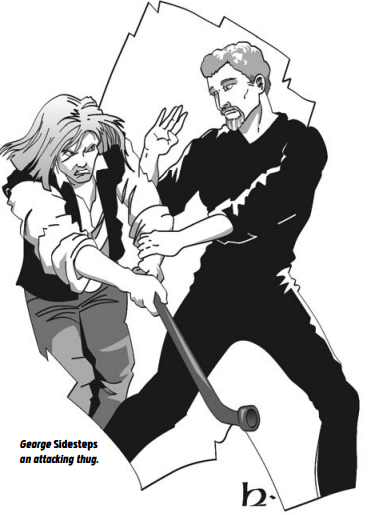
Notes and other GM fun
Class Combinations
Arguably something for GMs looking for NPCs more than the players, there is a section in the Modern Player's Companion that introduces what the designers call a class combination. This is basically a "recipe" on specific base classes, talents, and feats to combine together to make a specific character concept instead of trying to head straight for an advanced or prestige class. The recipes provided are for an archaeologist (Smart/Dedicated with a few levels of Charismatic spattered in), bouncer (Tough/Strong/Charismatic), counselor (Dedicated/Charismatic with a few levels of Smart), entrepeneur (Charismatic/Dedicated with a single level dip into Smart Hero to get more skill focus), lawyer (Smart/Charismatic with a couple of levels in Dedicated), lay clergy (Dedicated/Charismatic with one level dip in Tough Hero to get the talent Remain Conscious), pro athlete (Strong/Fast with a couple of dips into Tough), Reporter (Dedicated/Charismatic), and rock star (almost entirely Charismatic Hero, but with three one-level dips: a level in Fast Hero to get the talent Evasion, a level in Dedicated Hero to get the talent Empathy, and a level in Tough Hero to get the talent Second Wind).
Equipment
While there are a few modern amenities eschewed in the d20 Modern Core Rulebook such as laser pointers and duffel bags that get their stats here, the brunt of new equipment in the Modern Player’s Companion is made up of survival gear. Canteens and flasks, rain gear and waders, and fishing gear are all given for those adventurers who happen to not stay in the city all the time. Perhaps more relevant, however, are the idea of equipment packages. These are quick-select packages for a specific starting occupation that have a list of items for standard Wealth and further items added at Wealth bonuses of +5, +7, and +9 – they’re stated to be used for quick player character creation, but I could see them being just as good for fast NPC gear. The occupations that get listed equipment packages are Adventurer, Criminal, Law Enforcement, and Technician.
Notes of note
While technically not a segment unto themselves, this post wouldn’t be complete without a mention of the designer’s notes that are found in green text blocks scattered around the title. These are "why did we do what we did?" posts on the design process of d20 Modern and include such topics as the purpose of occupations (I already explained this), why having a combo of base classes instead of heading into an advanced class may be better for your character concept, and the reasoning behind what is made an advanced or prestige class feature versus what is made a feat (wider access [feats] vs. exclusivity [class features]).
----------------------------------------------------------------------------------------------------------------------------
Next time: the Modern Player’s Companion 2.
A Show of Character
Original SA postAlien Rope Burn posted:
I haven't really had plans to do them or really intended to claim them, so it wouldn't be sniping at all! Feel free to do Pathfinder stuff, I may return to it someday, but after doing the core it just feels like anything I would have to add would just just be beating on a dead horse. Certainly, you'd be better off doing the later Bestiaries , because there's more original creatures to comment on rather than my original misery of "fuck, what do I say about owlbears that hasn't been said?"
Adnachiel posted:
Alright.
Hex-O is credited with this monstrosity.I was under the impression that they were an in-verse producer of educational materials and the disclaimer for the thing you're talking about was just a way to cover their ass from... magical lawsuits or something.
How the fuck does that even work?! Goats are four-limbed vertebrates like us, why wouldn't a transmutation like that just involve "face becomes goat face, legs become goat legs" instead of goat head crotch ?

Thankfully, my post has nothing to do with horrific face-dicks. Instead, we get to start out with those requested class combo and occupation images from the Modern Player's Companion before we head into MPC2.
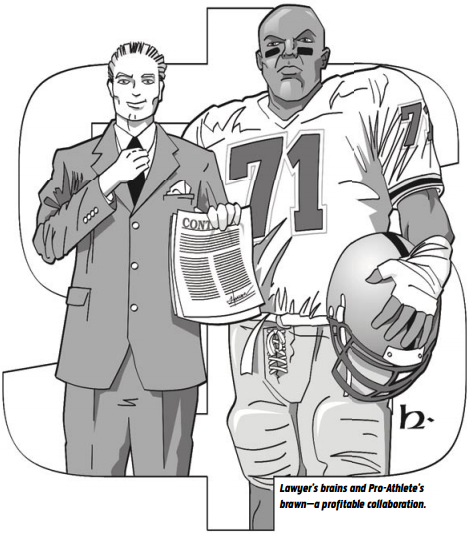
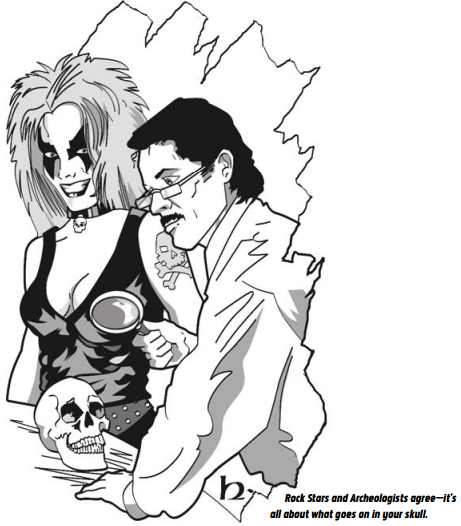
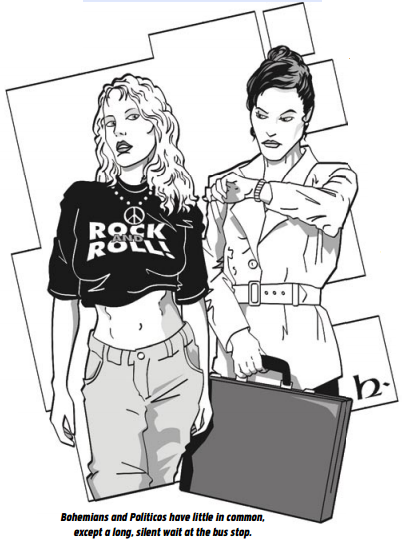
Alright then, with that out of the way, let's head onward.
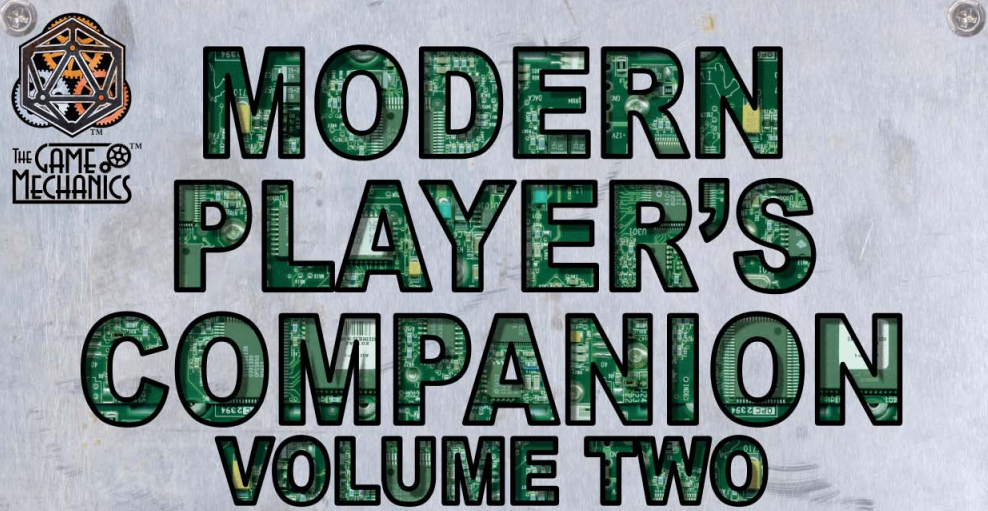
The Modern Player's Companion 2 covers both some d20 Modern staples the first MPC didn't cover and some features that were not truly relevant until Wizards of the Coast published the d20 Modern sourcebook Urban Arcana.
A Show of Character
Talents
One of the key features of d20 Modern is that its base classes are based on the six ability scores - these being the Smart Hero (Intelligence), Dedicated Hero (Wisdom), Charismatic Hero (Charisma), Fast Hero (Dexterity), Tough Hero (Constitution), and Strong Hero (Strength) - and have selectable class features ("talents") rather than the fixed class features of D&D classes. Unsurprisingly, the Modern Player's Companion 2 gives us some new talents for all six base classes.
-
Strong Hero:
The Strong Hero gets two new talents, both of which are tied to talent trees the d20 Modern Core Rulebook gave. The talent Greater Extreme Effort lets you take a full round action to take 10 on a Strength-based skill check, while the Improved Melee Critical talent lets you increase the critical hit threat range of a melee weapon by 1.
-
Fast Hero:
The Fast Hero gains a whole new talent tree, the Instinctive Response tree, with three talents within it. The talent Full Alert basically grants you Improved Initiative for free and stacks with said feat, Improved Evasion lets you take no damage on those whole "Reflex save for half-damage" powers such as breath weapons, and Heightened Reflexes lets you take 10 on a Reflex save and spend an action point to gain a +10 bonus to the Reflex save. IF that last one sounds crazy for a base class, it is, but the creators of d20 Modern seem to have an unfair amount of love for the Fast Hero.
-
Tough Hero:
Like the Strong Hero, the rough and tumble Tough Hero gets two new talents for talent trees it already had. The Improved Resistance talent doubles the energy resistance granted by the Energy Resistance talent, while the talent Stay in the Game lets the Tough Hero spend an action point to re-roll a failed Fortitude save against massive damage.
-
Smart Hero:
The Smart Hero gets two new talents
and
a new talent tree, lucky devil. The Adapt talent lets a Smart Hero that gets hit by the same enemy three times make an Intelligence check that, if successful, grants a dodge bonus to Defense against that foe equal to the amount of levels in Smart Hero the character has, while the talent Abuse Weakness lets the Smart Hero spend an action point to automatically confirm a critical hit. The new talent tree is entitled Deduction, and has three talents within its progression: Logical is a talent that lets you use your Knowledge skills to provide synergy with other skills (for instance, Knowledge [Current Events] grants you synergy with Gather Information, while Knowledge [Business] gets you synergy with the Forgery skill), the Talk a Good Game talent lets the Smart Hero replace a Bluff, Diplomacy, or Intimidate check with a Knowledge check for situations where the Logical talent would apply, and the Implacable talent lets the Smart Hero take 10 even when distracted or stressed for a number of Intelligence-based skills equal to 3 + the Smart Hero's Intelligence modifier.
-
Dedicated Hero:
The Dedicated Hero is another case of having two talents for old trees. The Observant talent grants the character's base Will save bonus to Sense Motive and Gather Information checks, while the Sixth Sense talent is basically a "least dangerous path?" divination with an action point cost instead of magic.
- Charismatic Hero: Last but not least, we have the Charismatic Hero with two new talents rather than a tree: Misdirect is a talent that lets the Charismatic Hero make a Charisma check during an attack action to convince an intelligent target to ignore them in favor of another "more dangerous" target (whether or not that's actually true), and the Greater Charm talent lets you attempt to immediately turn an unfriendly NPC into an apathetic one instead.
Variant Rules
Sort of pushed after the new talents are a few new variant rules for d20 Modern. The first of these is an interesting one on the topic of multilingual nations and cultures. The creators note that having one starting language is not exactly always realistic in our world of Earth, and that with the Game Master's permission you can have multiple starting languages without spending skill points. There aren't really many rules for this: fiction-based artificial languages cannot be granted by starting multilingual and must be granted by spending skill points (no starting Klingon for you, buddy), and the GM has the say on whether or not your selected languages are okay for your concept and the campaign (being a German-American doesn't exactly mean you should get Speak Elven as a bonus language).
The other variant rules are all discussions of money. The Wealth system d20 Modern runs on is meant to emulate having a modern individual's cash flow and banking ability rather than having gold coins in the back of your pocket any time you want something. Some people felt the system created was a bad decision and gave players too much freedom for buying goods. As a result, the creators decided that they'd address this in the Modern Player's Companion 2. Their answer is pretty much "don't do it, you dumbass, our system makes life easier", but they also give options for "bean counting" if you want to have your characters on a short leash for buying power or "credit rating" if you want to have your characters be Mitt Romney.
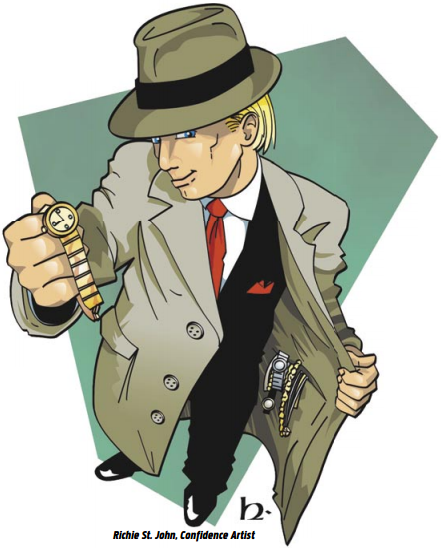
Advanced and Prestige Classes
Advanced Classes
More new advanced classes? Sure!
-
Arcane Scholar:
With this advanced class, you are king of the magic nerds. Rather than getting any spells, this advanced class focuses on resisting spells, figuring out the signs of magic, researching magic, and using supernatural equipment such as scrolls, wands, and the like. There's already a class in the d20 Modern Core Rulebook called the Occultist that is meant for low magic settings, and even it has more mojo than the Arcane Scholar, so I'm not sure what I'd call the niche of this advanced class. Really low magic? Magic wannabe? Magic: Charlie Brown Edition? I dunno.
-
Bounty Hunter:
This advanced class gives characters the powers of attack and investigative bonuses toward a specific target, proficiency at non-lethal takedowns, and shitty looking mullets.
-
Confidence Artist:
More of an antihero or NPC than your standard adventure, this advanced class reflects the gold-tongued con artist who is ultimately out for number one even if they are working with a team. Most of the class features involve boosting various social skills and Sleight of Hand based on the levels in this advanced class, with a few exceptions such as the ability to use the Bluff skill to shift blame for the Confidence Artist's crimes onto another person or convince bystanders it's all just a misunderstanding.
-
Fixer:
A very specific advanced class, the Fixer focuses almost entirely on gaining contacts and eventually being able to call in favors from strong NPCs when the occasion calls for it. There are also a few added tidbits such as a bonus to Wealth checks to find objects on-hand.
-
Hacker:
Do you like messing with computers enough to spend 10 class levels specifically for that? If so, I guess this is the advanced class for you. While I noted the Fixer is a very specific advanced class, that's more in scope than in potential, as a know-everybody individual can be useful in many settings. The Hacker advanced class more or less shoehorns you into having to have lots of computer-based encounters. I could see it being fairly interesting for some NPCs or in, say, a conspiracy theory campaign where you're striking out against The Man.
- Transporter: This vehicle-based class is one of the few cases of overlap between official d20 Modern material, sharing a lot of features with the Urban Arcana advanced class called the Speed Demon. The Transporter is a bit more focused on tricks and fancy moves compared to the Speed Demon's "juice this motherfucker!", however, so they manage to at least somewhat stand out from each other.
Prestige Classes
As stated in the last review, prestige classes in d20 Modern are defined as having 5 levels and meant for at least halfway through your character's career compared to the early access 10 level advanced classes. They aren't really used often in Wizards of the Coast's d20 Modern books or in that many third party sourcebooks I've read, but there are at least a few here for us to go over.
-
Commander:
The Commander is a prestige class that uses Charisma checks to give various boosts to allies or demoralizing enemies.
-
Dark Sage:
Interestingly enough, this prestige class entirely relies on the incantations system added in Urban Arcana rather than anything in the d20 Modern Core Rulebook. D20 Modern magic usually only goes up to 5th level spells, with anything more powerful being in the form of incantations, which take long periods of time, high Knowledge (Arcane Lore) checks rather than innate magic, and usually have some other high price such as expensive materials, backlash on the caster, or need for secondary casters. While this prestige class doesn't lower the time, it does lower other costs, eventually making the Dark Sage into a single caster with a single check. Think the experienced ritualist as opposed to the cabal of cultists.
-
Martial Arts Master:
I'm actually not going to go over this prestige class yet, as its primary class features are based on something from a different TGM sourcebook.
-
Master Tinkerer:
This prestige class has two main features - making mastercraft items and building robots. Both of these are made useless by materials in Wizards of the Coast's d20 Future sourcebook.
-
Mentalist:
Basically an Archmage for psionics.
-
Psionic Assassin:
A Soulknife squished into five levels.
- Silent Intruder: If the Infiltrator advanced class from the d20 Modern Core Rulebook isn't enough sneaking and thieving for you, this prestige class adds even more sticky fingers, disappearing from view easily, and hiding in plain sight.
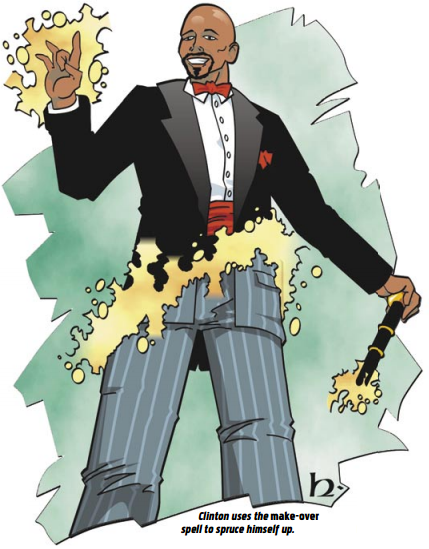
...And The Rest
Feats
Honestly, there's not much to say about feats this time around. Most are either psionic versions of metamagic feats, D&D imports like Cohort and Brain Burn, or a tree of feats that grants spell resistance. The only feats that really get to the standard of the first Modern Player's Companion are Follow That Car (spend an action point, tail a vehicle in a chase better) and Signature Skills (get two more permanent class skills on top of what you get from your occupation). There is also the 1st level only feat Multilingual and a similarly featified version of the Smart Hero's Linguist talent, but that was already gone over back in the segment on rules variants.
Equipment
The big deal around equipment this time is the books system, something that is rather novel and was surprisingly not even briefly mentioned in any d20 Modern supplements published by WotC. Basically, books give you an equipment bonus to specific Knowledge checks, the size and skill varying. For instance, a popular magazine on celebrities will only net you a +1 equipment bonus to Knowledge (Popular Culture) checks, while a heavily specialized textbook on biomechanics would grant a +5 equipment bonus to Knowledge (Physical Sciences) checks. There's even a handy way to replicate a whole library's worth of books for those cram sessions.
Modern Player's Companion 2 also has some more equipment packages. These are not only more occupations than those from the equipment packages segment of the original MPC, there are even some packages this time around that are tailored toward multiple similar occupations rather than just one. The equipment packages provided are for Academic, Blue Collar, Emergency Services, Jet Set (the Celebrity, Entrepeneur, and Dilettante occupations) Military, Scientist (Doctor and Technician), Vagabond (pretty much any occupation on the move), and White Collar.
FX Abilities
Last but not least, the Modern Player's Companion 2 gives those who want a big more magic in their lives just that. Since there aren't a huge amount of spells or magic items, I'll be going over all of both. Let's start with the spells.
-
Catalog:
A 1st level arcane spell that lets you touch a container size Huge or smaller and get a written list of all of the items inside of it in generic terms. Good for those who are really obsessive about their stuff.
-
Close Shave:
A 0 level arcane and divine spell for making where you touch smooth and hairless for a week per caster level. I'm sure there's some use for this someone can think up that isn't related to vanity.
-
Computer Catalog:
Catalog, but for the programs and files on a computer.
-
Fast Food:
Another 0 level arcane and divine spell. You sacrifice a menu from the food place in question and a $5 bill and get a warm, fresh meal from the place in question. I guess this could be a good use of a spell slot if you're really strapped for food.
-
Fill Prescription:
A 2nd level divine spell that lets you bypass the doctor's office by summoning a dose of medicine yourself. You need an authentic medical prescription pad as a material component, though.
-
Make-Over:
This 2nd level arcane and divine spell changes up your clothing, hair style, and makeup. It's only used for snazzing things up (or dressing them down, potentially), not for doing something defensive such as turning street clothes into armor or anything.
-
Mood Lighting:
A 0 level arcane and divine spell. You can dim lights in a room to low-light levels or up them to daylight levels, though the latter doesn't work as natural sunlight would and thus won't be made into a cheap anti-vampire assault spell.
-
Personal Soundtrack:
AKA the best spell ever. With this 1st level arcane and divine spell, you can make a certain action lead to a certain sound occur, like having a sick guitar riff play whenever you attack or your walk result in Stayin' Alive playing around you. On the one hand, it's a purely cosmetic spell with no in-game effect, but on the other hand

-
Resurrect Computer:
A 3rd level divine spell for when you really need to repair a broken computer and make it good as new.
-
Search Room:
You get a super-boosted Search check for a specific object with this 1st level arcane and divine spell.
-
Send as Attachment:
This is probably one of the coolest spells in the Modern Player's Companion 2. With this 4th level arcane spell, you can send physical objects from one place to another by magically attaching them to an e-mail and send it to the desired destination.
- Tidy Up: A 2nd level arcane and divine spell, Tidy Up cleans a room and straightens up any mess.
And for the magic items, we have...
-
Backup Disc:
You can copy a computer's hard drive without needing any access to it or waiting for data transfer. Only one copy can exist on the CD at a time.
-
Barrel of Monkeys:
A child's toy turned into a weapon (sort of), you can summon 1d4 monkeys from this plastic barrel. If your foes aren't injured by the monkeys, I'm sure they'll at the very least have some lung damage from fits of choking laughter at the silliness of the situation.
-
Grinder Organ of Obedience:
You get a +5 bonus (or +10 against non-human primates) to Handle Animal checks as long as you turn this organ grinder.
-
Laser Pointer Grappling Hook:
This laser pointer is capable of acting like a grapple-firing crossbow, for when you don't want to carry a whole crossbow around.
-
Medicine Bottle:
The
fill prescription
spell as a magical item.
-
Observant Ornament:
A lawn gnome, desk bobblehead, or some other such ornament that lets you see and hear from its perspective for up to 10 minutes once per day.
- Portable Hub: A LAN that needs no wires, instead having special magical nodes that lets computers connect together to it no matter how far away they are.
-----------------------------------------------------------------------------------
Next time: we have three more d20 Modern companion series and a minor sourcebook from The Game Mechanics to go. You, the viewers, choose what we subject we go for from them next - kung fu action, future stuff, cops and robbers, or urban magic.
It's Magic, You Know
Original SA post
I had planned on this being up sooner, but I ended up being
consumed by Pokemon
busy. Very,
very
busy.
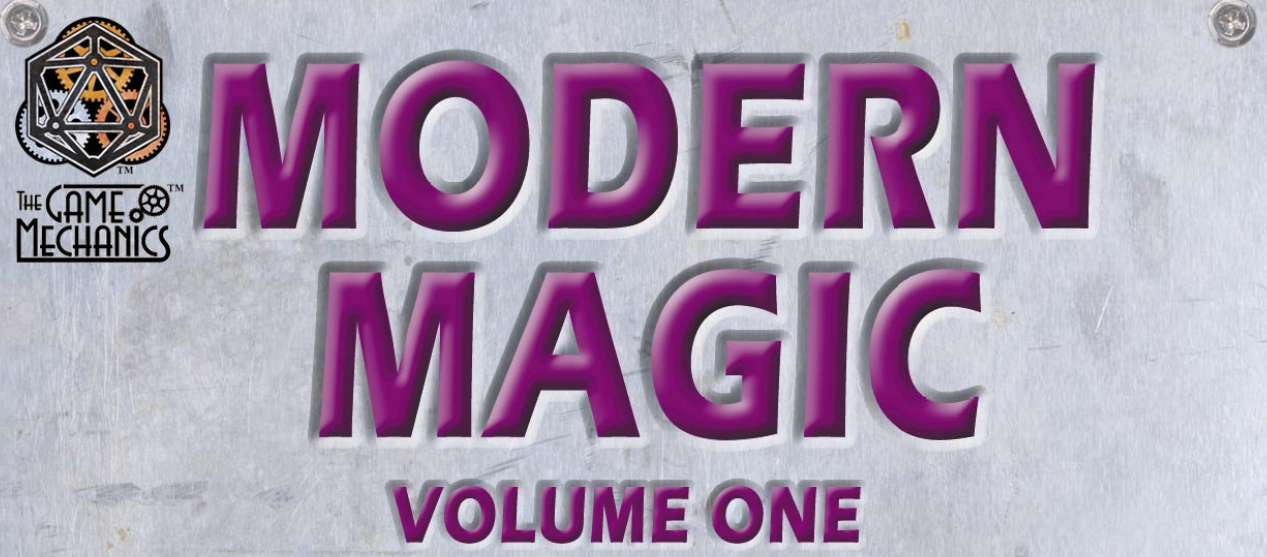
Released in May of 2003, Urban Arcana was the first supplement Wizards of the Coast produced for d20 Modern, for both better and worse. It was a pretty solid sourcebook in my opinion, giving a lot of new options for urban fantasy games such as fantastical species and new spellcasting classes as well as options for more down to earth campaigns like the Street
Fighter
Warrior and Swashbuckler advanced classes, lots of urban gear like glass cutters and various rescue tools, and new vehicles such as fire trucks and tug boats...but also helped perpetuate the stereotype of d20 Modern as "just D&D with guns" by deciding that the campaign setting part of the book should have mentions of gods and concepts from Greyhawk like Kyuss and his spawn, St. Cuthbert, Pelor, and Wee Jas. Modern Magic is more or less the Modern Player's Companion equivalent for Urban Arcana's urban fantasy aspects sans the Greyhawk baggage, and it's what we are going to be looking at today.
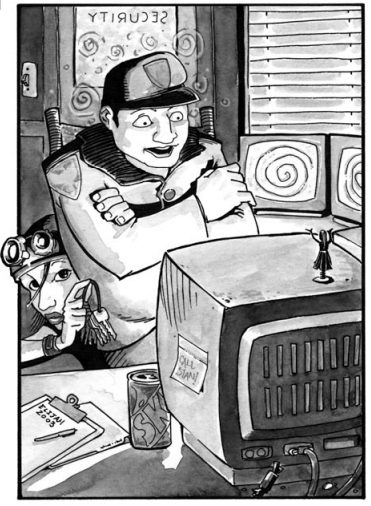
It's Magic, You Know
Not one to tease, Modern Magic's very first chapter is a glut of new spells. They are broken down into twenty-two arcane spells, six divine spells, and five spells that are accessible by both arcane and divine spellcasters. For school coverage, there are no Necromancy spells, one spell without a listed school, one Enchantment spell, two spells that are listed as having two schools at once, two Abjuration spells, three Evocation spells, three Illusion spells, four Divination spells, eight Conjuration spells, and a whopping nine Transmutation spells. And level coverage? Definitely a bit front-loaded, with five 0-level spells, eleven 1st Level spells, five 2nd Level spells, six 3rd Level spells, four 4th Level spells, and two 5th Level spells.
The spells themselves may have a predilection towards two schools and lower levels, but they still have a decent variety to them. There's no real favoritism toward "spellcasters should be fighting" versus "spellcasters should be helping" or "spellcasters should be stealthy", instead having a little something for various roles. I've cherry-picked some of the book's spells that are particularly interesting or I am rather fond of to list below.
-
Cellular Hand (1st level arcane Evocation):
Holding your fingers in a way that pantomimes holding a cell phone is a bit more useful when you are actually capable of magically broadcasting and receiving a signal from your hand.
-
Fingernailgun (0-level arcane Conjuration):
You can shoot iron nails out of your index finger. It's more meant to be a handyman aid for repairs and does very little damage in actual combat, but who cares because you are
firing nails from your fingers
.

-
Hypnotic Screensaver (1st level arcane Illusion):
This spell allows you to transform a computer screen into a dazzling display of, and I quote, "magically enhanced pixels". A spell that is both useful and amusing to see when you do something like stun a dangerous but dim-witted foe with the Windows hyperspace screensaver.
-
Itchy Trigger Finger (3rd level arcane Transmutation):
Touching someone with this spell makes them fire off a surprise round shot with a firearm they are holding. Given that the material component of the spell is crushed poison ivy powder, I can't say I blame them for firing wildly.
-
Reverse-View Mirror (5th level divine Divination):
You get to see up to 15 minutes from the last trip the vehicle you are sitting in took as seen through the rear windshield.
-
Save to Disk (5th level arcane Transmutation):[/b] Simultaneously really neat and kind of creepy,
save to disk
is a spell that allows you to "write" a willing individual onto a CD-ROM. The creepy part is that the spell doesn't say whether you are conscious or not when on the CD, just that you reappear in the real world next to the CD when the file is clicked on a computer, the CD is broken, or 72 hours pass without either of the former happening. The spell also happens to not specify what can be put on a CD beyond "a person", so theoretically you could put something like a troll on it as a horrible trap.
-
Vigilant Vermin (2nd level arcane Conjuration/Enchantment):
Nothing says "I'm a weirdo" like summoning a horde of pigeons or rats to spy for you.
- Whorlooparch (1st level arcane Transmutation): A really devious spell, whorlooparch twists and contorts your fingerprints every time you touch something during its duration, causing the prints to be left as a jumbled mess that looks more like someone hacked up their finger and glued it back together than what an actual fingerprint should look like.
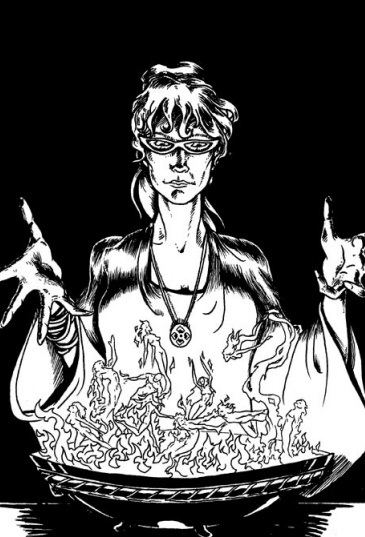
Words and Actions of Power
As I have stated before in at least one previous review, incantations were a system introduced in Urban Arcana to allow 6th level and higher spells to exist in the form of long, complex rituals that anyone capable of making the proper Knowledge (Arcane Lore) checks could cast. Modern Magic decides to take the incantation system and tone it down, creating a form of swift but still Knowledgee-based rituals that more closely replicates things such as Hermetic magic and Lovecraftian magic compared to the standard d20 system's "boom fireballs!". The head honcho of lesser incantations is the Ritualist advanced class, which focuses on magic circles, charms, and enhancing the casting of elemental spells and incantations. Lesser incantations themselves are basically just incantations that have short (usually instantaneous with a duration) casting times, small Knowledge DCs, and minor effects.
The chapter on ritual magic also introduces the Laws of Magic, ways of decreasing the Knowledge DC of proper incantations. The Law of Names posits that those who know the name of a target hold some magical power over it (ranging from a -1 to the Knowledge DC for just knowing the full name of the target to -8 for having knowledge of the target's "true name"), the Law of Connection is tying ownership to the spell (ranging from a -1 for having a personal possession of the target to -4 for having their blood or some other body fluid), and the Law of Sympathy indicates that like is stronger with like (ranges from -1 for a doll or toy representing the target to -4 for physically manipulating the target during the ritual in an appropriate manner, but also has a potential +1 to +4 penalty if you do something counter to the incantation's purpose such as lighting a candle during a water-related ritual).
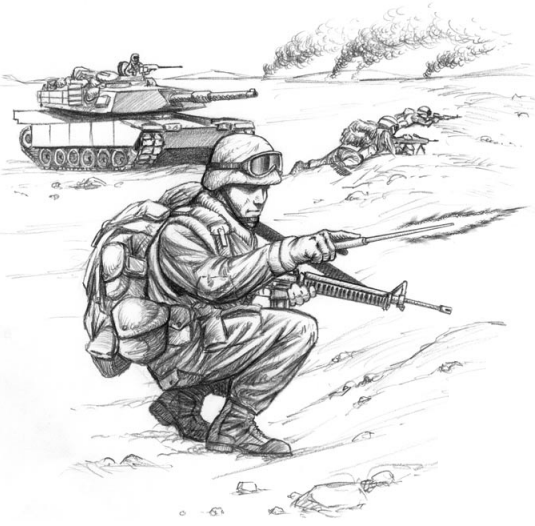
(Magic) Army Strong
The third chapter of Modern Magic deals with a very specific topic, namely the military applications of magic. In addition to the idea of military-issue spellbooks where your commanding officer limits what spells you can utilize, there are three campaign ideas for military magic presented: Rare and Secretive (there's a dangerous hidden world out there and one or a handful of shadowy agencies capitalize on that with magical agents), Available and Specialized (magic is open knowledge but very few people actually know how to control it, with intelligence agencies being one of those that hold the power), and Common as Dirt (eldritch tanks and foot soldiers shooting lasers out of their hands are no big deal). To augment these concepts there are various new game rules, including a new advanced class and two new prestige classes. The Magic Grunt advanced class isn't the most powerful spellcaster around, but augments its lesser magic functionality by casting better in armor, broadening the area of spells' effects, and resisting enemy magic. The two prestige classes, the Thaumaturgist and Arcane Spec-Op, are both meant to augment spellcasting advanced classes: the Thaumaturgist basically grants Mage class features to spellcasters who don't have the Mage advanced class, while the Arcane Spec-Op is a dangerous foe who is skilled in assassination techniques and combining guns and spells.
If you want even more military magic fun, there is also a new feat called Armored Caster that lowers your arcane spell failure chance in armor by -10%, as well as two metamagic feats called Fork Spell (doubles the amount of targets of a spell) and Mass Spell (increases the targets of a spell to half your caster level, so have fun with that smoldering crater of foes).
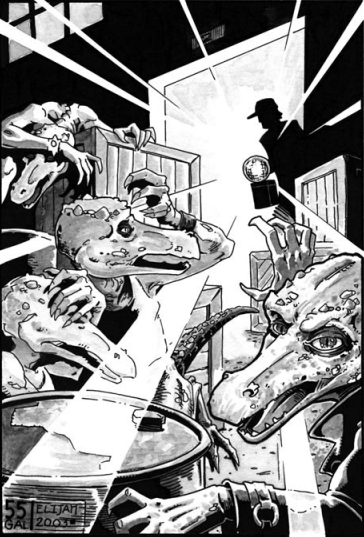
The Emporium
Last, but certainly not least, in Modern Magic is the chapter on magic items. There are a total of thirty-eight new magic items, ranging from silly but clever entries like the balloon of air elemental summoning to more down to earth and practical devices such as the marksman's bullet . As with spells, I'll be listing some that are either interesting or I am personally fond of to give you an example of what you'd be getting into.
-
Door Hangar of Privacy:
This magic item combines a noise-cancelling aura with a "don't look at me" compulsion to give the room behind the door privacy for any number of reasons. Perfect for your secret meetings or covert assassinations.
-
Hand Buzzer of Voltage:
The classic "joy buzzer that actually deals 1d8 points worth of electrical shock". An oldie but a goodie in my book.
-
Light Bulb of True Seeing:
One of those items that is easy to overlook but really interesting to think about, the area illuminated by this lightbulb is affected by the
true seeing
spell. I can imagine a particularly paranoid individual having their house just littered with these, making sure that no invisible being or illusionist can get past them.
-
Nosferatu Fangs:
You know those novelty vampire fangs you can get as Halloween knick-knacks? Well, it turns out you can enchant them to become hard fangs that deal 1d4 bite damage and can do blood drain like a real vampire.
-
Pet Rock of Earth Elemental Summoning:
Need I say more than the name of this one?
-
Sunlike Floodlight:
A special bulb implanted in a floodlight that allows it to produce the
daylight
spell six times before it burns out and needs to be replaced.
- Voodoo Doll: While you know what a voodoo doll is, I figured I'd at least inform you just what the magical item does. It deals 2 damage to one ability score of the target as long as they are within 10 miles and the pin is in the doll, depending on the location the pin is placed: Strength for the arms, Dexterity for the legs, Constitution for the chest, Intelligence for the forehead, Wisdom for the stomach (?), and Charisma for the face.
There are two appendices after the final chapter, one showing what lesser incantation elements can be used to replicate existing spells and another that has d20 Modern conversions of size Large elementals of the four classic types. Hooray.
---------------------------------------------------------------------------------------------------------
Next time: Modern Magic Volume II, wherein varied divine spells, Haitian rituals, and magic CSI occur.
Absolutely Not An Episode of AHS: Coven, Despite Voodoo
Original SA post
AccidentalHipster’s review of Naruto d20 reminds me that there was also a d20 Modern Pokemon fan-sourcebook of all things.
 I've never been able to actually find it again, and the XP laptop that I had originally read the PDF on literally went up in flames ages ago.
I've never been able to actually find it again, and the XP laptop that I had originally read the PDF on literally went up in flames ages ago.
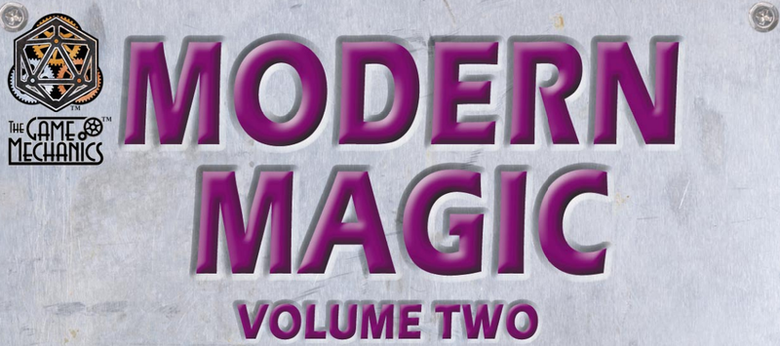
Modern Magic Volume Two has a bit of a different focus than Volume One. While the first volume of the pair focused heavily on traditional urban fantasy genre conventions, Modern Magic Volume Two has a larger focus on translating real world religious beliefs and superstitions into something with real power. Of course, we're still going to start out with spells that can be quite varied in their use, so let's not be too hasty on that matter.
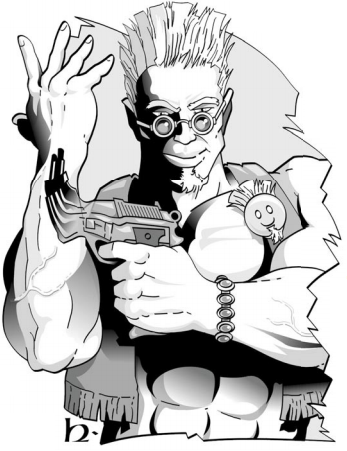
Arcane Art
s
The spells presented in chapter 1 of Modern Magic Volume Two are just as mage-focused as the first volume, with eighteen arcane spells opposed to seven divine spells and seven spells useable by both types of spellcaster. For spell school coverage, we're still pretty strong on the same themes as well: nine Enchantment spells, eight Transmutation spells, five in Illusion, three in Conjuration, three in Divination, two in Evocation, one in Necromancy, and then one spell that counts as both Abjuration and Conjuration.
The spell levels are probably where Modern Magic Volume Two's new spells differ the most, being less front-loaded and more mid-loaded with three 0-Level spells, eight 1st Level spells, ten 2nd Level spells, seven 3rd Level spells, and four 4th Level spells. No 5th Level spells this time, sorry to you power players out there. As with last review, let's look over some of the more notable/interesting ones.
-
Carillon (4th Level divine Enchantment):
One of the more unusual spells I've seen, casting
carillon
causes a joyous chime chorus that makes your allies get a morale bonus to attack rolls and saving throws against fear and your enemies suffer a morale penalty to the same things.
-
Divine Copilot (3rd Level divine Conjuration):
Never has "Jesus take the wheel" been quite so literal. This spell lets you summon an invisible presence that intervenes in a failed Drive or Pilot check to help you.
-
Object to Ink (3rd Level arcane Transmutation):
You can transform an object equal to or smaller than yourself into a tattoo on your body. While the obvious applications include things like sneaking weapons past someone, safeguarding an item, or carrying things that would normally over-encumber you at the time, the fact that the book explicitly states "because items affected by
object to ink
are held in stasis, even a ticking time bomb can be turned into a tattoo using this spell" makes my mind immediately turn to more devious uses.
-
Rebroadcast (3rd Level arcane Illusion):
This spell allows you to make a CCTV camera loop on itself for a while, covering your tracks while you do whatever you plan on doing in that camera's view during that time. The fact that the spell
burglar's buddy
from Urban Arcana explicitly targets all electronic surveillance
except
video makes me think that these two spells used in tandem would be a pretty damn good coverup.
- Yardbird (2nd Level divine or 3rd Level arcane Enchantment): You compel someone to loiter somewhere. While it could have practical uses like making a guard feel like he needs to go stretch his legs and bum around the parking lot or something, I'll admit that this spell is noteworthy mostly because it amuses me to imagine an angry mage initially inventing this spell. "No loitering?! Well, I'll show them!"
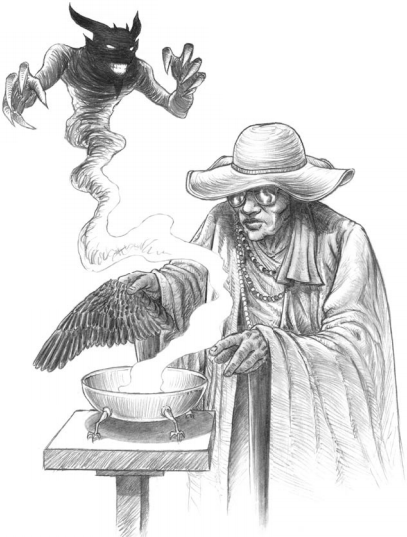
Urban Vooodoo
Voudon (the spelling used by the writers here), also known as vodou, vodun, or voodoo, is a mingling of western African religion with Caribbean traditions and - in the case of Louisiana voodoo, at least - Catholicism. It also just so happens to be the focus of the second chapter of Modern Magic Volume Two, presenting voudon as an alternative magic system. It can be used as the only magic system in a campaign, one of several ritualistic magic systems, or even just one form of ritual magic that exists alongside more "game-y" magic. To truly understand how voudon works in d20 Modern, though, we need to dive into the two advanced classes that use it in two very different ways.
The first voudon advanced class is the Houngan, a divine spellcaster who has a heavy burden to bear...if spirits are heavy, that is. They get their power from the Loa, powerful spirits that may or may not cross into deity territory depending on whose religious practices you ask. In addition to having to perform a ceremony known as the Great Caille every week in order to keep their divine spellcasting juiced, the Houngan advanced class has the ability to call upon the Loa to "ride" (possess) them. While possessing the Houngan, a Loa imparts specific bonuses and penalties to ability scores and/or free ranks in a certain skill that increase in number as the Houngan gains levels in that advanced class, but in return the Houngan character must roleplay certain personality traits. Offending a Loa means the Houngan gets placed under a "burden". That burden has roleplaying restrictions and removes the ability to cast certain spells that are associated with that Loa until a specific ritual to atone is made. The specific Loa given in the title are as follows.
-
Agwe:
The ruler of the waves and the things that swim within it or sail upon it, Agwe is a handsome mixed race captain who is brave, courteous, and quite the lady's man given that he has the marriage hand of both the Loa of love Erzulie Dantor and the Loa of the rivers Mami Wata. A ride from Agwe imparts a bonus to Wisdom and free ranks in Swim and Navigation at the cost of a penalty to Dexterity. He's probably one of the Loa you least want to piss off, as his burden keeps you from crossing or entering any body of water, even something as simple as a puddle or a bath.
-
Ashadeh Boco:
A fiery spirit, Ashadeh Boco is associated with freedom and creativity. Her rides grant q bonus to Intelligence and Charisma but a penalty to Dexterity and Constitution, and her burden is for the transgressor to speak only in rhyme and be unable to use fire for any purpose.
-
Baron Samedi:
The loa everybody knows. He of the fancy suit, lewd attitude, and portfolio associated with death. Sadly, while most of the Loa in Modern Magic Volume Two are pretty accurate to actual voudon beliefs, Samedi gets a complete makeover into a generic sinister villain complete with Snidely Whiplash brand twirly mustache, as he so often unfairly does. His ride provides a bonus to Strength and Charisma but a penalty to Intelligence and Constitution, while his burden is for the transgressor to lug around a very heavy object and not help anyone for any reason.
-
Carrefour:
While kind of creepy, Carrefour at least stays true to lore and doesn't get beaten with the evil stick here. He's the loa of the Crossroads and all the freaky shit that goes down at them, and he can provide a bonus to Wisdom and free ranks in Sense Motive at the cost of a penalty to Dexterity and Charisma if he rides you. Carrefour's burden is constant fatigue due to poor sleep.
-
Damballah and Ayida Wedo
Damballah Wedo the creator serpent and his wife Ayida Wedo the rainbow serpent are pretty damn important in voudon, so much so that in Louisiana voodoo they are directly associated with Jesus and Mary. The two ride together, which means two potential hosts need to be in the same place - both receive the benefits of a bonus to Dexterty and Intelligence as well as free ranks in Knowledge (Theology and Philosophy), but at the cost of a penalty to Wisdom. Damballah is too busy being a creator figure to care about burdens, but Ayida will punish transgressors with the burden of either constant public nudity or having to constantly carry around and protect a chicken or some other egg-laying animal.
-
Dan Petro:
While traditionally the patron Loa of farmers, Dan Petro is presented here as a freedom fighter. His ride grants a bonus to Dexterity and Charisma as well as free ranks in Escape Artist, with penalties going to Strength and Wisdom. His burden is for the transgressor to free any enslaved or oppressed person they meet at any cost.
-
Erzulie:
The Erzulie here is a representation of Erzulie Freda rather than the more awesome and
 Erzulie Dantor, being a Loa of beauty, love, vanity, and jealousy. She grants a bonus to Charisma and free ranks in Diplomacy at the cost of a Strength penalty, and her burden is to make the transgressor crossdress and act like a stereotypical member of the opposite gender.
Erzulie Dantor, being a Loa of beauty, love, vanity, and jealousy. She grants a bonus to Charisma and free ranks in Diplomacy at the cost of a Strength penalty, and her burden is to make the transgressor crossdress and act like a stereotypical member of the opposite gender.
-
Ghede:
While presumably meant to be Papa Ghede, the first man to die and head of the Ghede family of Loa, the Ghede presented in Modern Magic Volume II just so happens to have the traits typically associated with Baron Samedi transferred onto him as a "good" alternative. The ride of Ghede...kind of sucks, honestly, as it only has a bonus to Constitution but has a penalty to Wisdom and Intelligence. His burden is to do unspecified humiliating acts in public.
-
Legba
Papa Legba is the Loa who acts as the intermediary between the human and Loa worlds. Legba's ride grants a bonus to Wisdom and Strength combined with ranks in Knowledge (Arcane Lore) and Knowledge (Theology and Philosophy), but has a penalty to Constitution and Strength. His burden is eithre to move at half speed and suffer a -4 penalty to Initiative or to never go outside when it is daylight.
-
Loco and Ayizan:
The first priest and first priestess respectively, Loco and Ayizan do tag team possessions like Damballah and Ayida Wedo. Their rides provide a bonus to Wisdom and either ranks in Treat Injury for Loco or ranks in Diplomacy for Ayizan, with the ability score penalties being to Strength and Dexterity. Loco's burden is to make the transgressor that LARP guy who loudly yells out their spells before casting them, while Ayizan prevents any harmful actions from being taken.
-
Ogun:
Ogun is the Loa of metalworking and war, as well as an instigator of armed revolution, and is fond of tobacco and rum. His ride grants bonuses to Strength and Constitution as well as ranks in Knowledge (Tactics), with the penalties going to Intelligence and Wisdom. He can give one of two burdens that are pretty much the opposite of each other: either be unable to hold any metal objects or constantly carry the largest sword the transgressor can contain.
- Simbi: Simbi is both a water loa and the Hermes-like divine messenger of Legba. With his ride, you get a bonus to Wisdom and Intelligence combined with ranks in Sene Motive and Diplomacy, at the cost of penalties to Strength and Dexterity. His burden is to constantly speak in a whisper.
After the complexities of the Houngan, it's probably for the best that the arcane spellcasting voudonist is a lot simpler. The Bokor advanced class is capable of creating magical charms, summoning djab (any creature with the Outsider creature type), and eventually being able to perform a ritual to transform someone into a sombi as the capstone ability of the class. I'll go over the zombi in a minute, but first I'd like to note the fact that the Bokor's arcane spellcasting works a little bit differently than the standard Mage's. The Bokor's magic has the "Bokor's price", which causes them to take 1d4 + the spell's level worth of damage any time they cast a spell. No pain, no gain, I guess.
Last but not least for chapter 2 is the whole deal about those zombi. Rather than being undead like zombis, the zombi template is applied to a Humanoid and they stay Humanoid in type. It is mindlessly subservient to the bokor that created it, however, and has the ability to be turned as if it were an undead creature with +4 turn resistance. Zombi are also capable of fighting even when they are dying, have higher Strength than their normal form, and can punch things harder than your average Joe. The zombi template is removed and the character goes back to normal when either the vessel that holds their soul is broken or the Bokor releases them of their own free will.
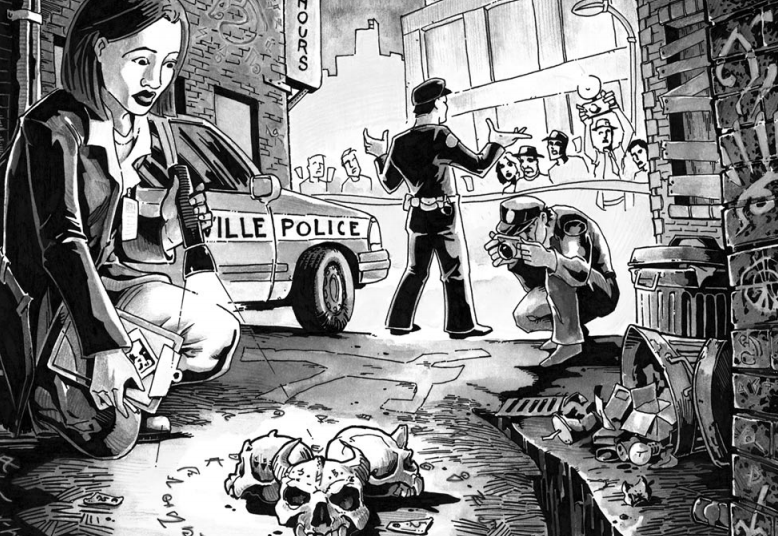
When Worlds Collide
The third chapter of Modern Magic Volume Two is entitled "Mundane Magic". If the title confuses you, it can be summed up as "weird shit that people who can't cast spells or incantations can still do". These are little rituals or charms that help non-magical players deal with magical foes. Or so the idea is, at least, as the granted boons for most of these can be best described as quite minor. As with spells and magic items, I'll be listing some noteworthy ones to avoid to much clogging.
-
Prayer:
Yes, it turns out that spiritual warfare does indeed work. Sacrificing an attack action to pray at a foe allows you to add your ranks in Concentration to Will saves made against either divine spells or the powers of creatures with the Outsider type.
-
Ghost Money:
A talisman from Chinese folk tradition, ghost money is yellowed paper or a special coin that provides a +1 bonus to saves against mind-affecting Enchantments or the powers of undead creatures.
-
Rabbit's Food:
A lucky rabbit's foot is surprisingly specific in what it defends against, as it only provides a +1 bonus to Reflex saves against Conjuration spells. How many Conjuration spells even force a Reflex save, anyway?
-
Thousand-Stitch Headband:
A Japanese embroidery that provides a +1 bonus to saves against Divination.
- Wolfsbane: In addition to being poisonous, hanging wolfsbane as a talisman gets you a +1 bonus to saves against Transmutation.
More useful than any of these trinkets are the feats that come after them. Magical Ground is a feat that grants spell resistance equal to 5 + half your total character level. This would be good enough on its own, but it also lets you take Magical Sink, a feat that makes you into a walking anti-magic field that forces anyone in the area to succeed on a level check with a DC of 5 + your total character level if they want to cast any spell or use a spell-like ability near you. While you can't get any spellcasting class levels, cast incantations, or even use magical items (including potions), the sheer defensive capabilities these feats give you against the supernatural is pretty damn desirable. They are also just sort of stated as something you can do rather than implementing the Anti-Magic Atheist cliche I have seen in way too many d20 Modern titles.
Finally, the chapter ends off with a really interesting discussion of how magic affects crime and punishment. Not only does it show how spells can be used for crimes, such as casting mage hand to do a minor deed with major consequences such as remotely flicking the trigger of a sitting gun to make a murder look like a suicide, it also discusses how mundane but knowledgeable people can figure out the hallmarks of a supernatural crime even though they can't pop out detect magical aura whenever they want to, spells that aid in investigation if you are a Harry Dresden type, and even workarounds for the pressing question of how to prosecute a supernatural criminal even if you are in a world where magic isn't commonly believed in. There is also a handy new advanced class, the Arcane Investigator, which allows for a character to sniff out the supernatural even though they themselves are not necessarily spellcasters.
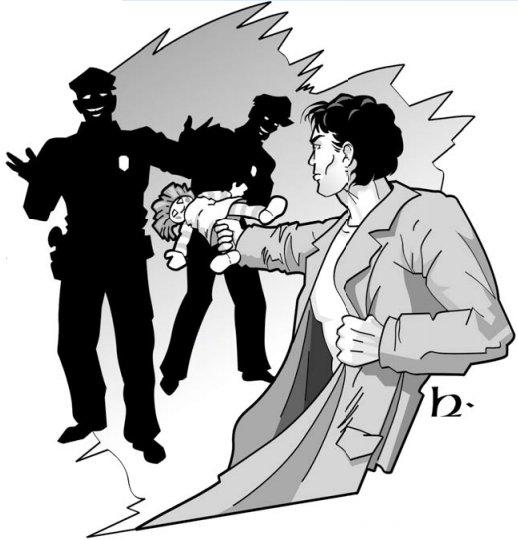
The Item Shop
Magic items: you want 'em, we've got 'em. 29 of them, in fact. Let's cut to the chase and hit the highlight reel.
-
Covert Ops Cockroach:
A construct made to look like a dead cockroach, this kind of gross but nonetheless useful device puts out about 10 minutes worth of radio recording before it shuts down. Super fun at spy parties, order yours today.
-
Enchanted Charm Bracelet:
Each of the little trinkets on this charm bracelet hold one use of a spell or supernatural power. While reloadable with more charms, the bracelet immediately loses any magic potential if you let it fully run out of charms on it. Some of the charms include an ankh that casts
cure serious wounds
, a moon that casts
darkvision
, a skull that casts
animate dead
, and a Hermes shoe that doubles your base speed for 10 rounds.
-
Parachute Pants:
This magical item has the combined function of being able to cast
feather fall
once per day and allowing you to be the brunt of MC Hammer jokes.
-
Potion Bottle Opener:
A bottle opener that can be used once per day to turn the contents of the bottle it opens into a potion, allowing you to have a quick and refreshing magical aid.
- Sturgis Bandanna: A colorful bandanna that grants a +10 bonus to Ride checks made on a motorcycle. I can only presume this is a typo, as motorcycles use the Drive skill, but maybe it's just meant to be used with some really weird legged wizard-cycles or something.
We are also provided with four new magic weapon qualities, two of which only apply to firearms. Chameleon is a weapon ability that lets you take an attack action to turn your weapon into a similarly-sized mundane item or back again, Hollywood is a firearms-only magic weapon quality that lets you keep firing in combat even when you are out of ammunition but requires you to feed the leftover amount you "owe" back into the weapon once combat is over, versatile grants your magical gun an extradimensional second ammo clip with a different type of ammunition from your actual clip so that you can freely switch between two ammo types without reloading the main clip, and whispering lets you make the ranged weapon it is applied to fire completely silently twice per day.
---------------------------------------------------------------------------------------------------------------------------------------
Next time: We will not be looking at another TGM product or even another d20 Modern title, as I'll be taking a break from those.
Why?
Well, it's the month of Thanksgiving here in the U.S. of A., and that means only one thing: alternate history Colonial America with technomage Benjamin Franklin!
